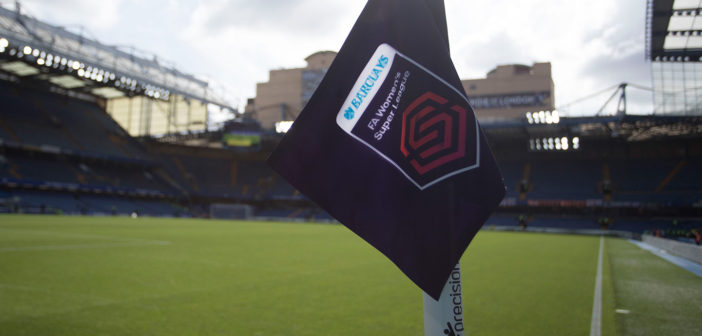Like the Bernie Sanders meme currently doing the rounds, I am once again… complaining about the inequalities in women’s football. Although you’d be forgiven for thinking the last five years have been one long, protracted complaint…
It’s hard to imagine any circumstances in which a current English international and/or league champion would take to social media to ask if anyone could spare the equipment needed to aid their rehabilitation. Yet at the end of last month, that was exactly what happened when Arsenal attacker Beth Mead took to Twitter to ask help procuring a bike to aid her recovery from a medial collateral ligament injury that has left her unable to run.
In need of a @wattbike during this difficult time, currently rehabbing my knee so can’t run so one of these is needed. If anyone can help please reach out ☺️. pic.twitter.com/7O9qnCqKXL
— Beth Mead (@bmeado9) March 24, 2020
The striker cum winger was soon sorted by her rehab clinic but she’s not the only player who’s found herself in the position of not being able to train or rehab as she would outside of lock-down. There is rightful indignation when you see players from the men’s game posting their training from home on social media, using the kit you’d expect to find at training grounds across the country. Only to see professionals from the women’s game having to make do without the necessary equipment.
In the case of Reading’s Remi Allen, the implications of the lockdown have seen her be booted out of four different parks just to trying to train. From the outside, it would be easy enough for the local police to see a couple of players with cones and balls and be worried about individuals breaking government guidelines, but what are the players to do? As Allen’s teammate Natasha Harding pointed out, a footballer’s version of working from home can’t be done sat at a desk.
Having a PR nightmare this month, Liverpool (that is, their owners, Fenway Sports Group) have drawn the ire with their announcement intending to furlough non-playing staff. The condemnation has been swift, whether it be from former Liverpool players, pundits or fans. As women’s football journalist Suzy Wrack tweeted out, “Anyone who has seen the club’s attitude to their bottom-of-the-table, underfunded and undervalued women’s team will not be overly surprised by this gross greed.”
Anyone who has seen the club’s attitude to their bottom-of-the-table, underfunded and undervalued women’s team will not be overly surprised by this gross greed. https://t.co/XRw1YMakcK
— Suzy Wrack (@SuzyWrack) April 4, 2020
As for the women’s team during lockdown? Well no fear, they’ll have skipping ropes dropped onto their doormats courtesy of the club that made a £42m pre-tax profit last season.
Say hello to our old friend, polarisation
But before we start to sharpen our pitchforks – a fun, government approved way of killing time in self isolation – we need to take a step back and look at the Women’s Super League in its so-called professional entirety. Let’s say, for arguments sake, Liverpool managed to procure all the best fitness machines for players in the women’s team and managed to get everything sent out by digging their paws a little deeper into their deep pockets. Let’s say, all the women’s teams affiliated with Premier League teams could do that… what of the teams that don’t exist as a branch of a PL entity?
What of the Readings, Bristol Citys and Birmingham Citys? Or just even the teams further down the Premier League rungs whose belts will require serious tightening to get through this health crisis unscathed?
If we are to assume (hope?) that the Super League will actually be allowed to run its course with the remaining matches played out when its safe to do so – whenever that may be – are we not inviting further disparity between the haves and have nots? From the players whose clubs can provide equipment for them to use at home to those making do with what’s available to those without any green space at home and being booted out of parks, there will be a clear lack of level footing.
Can someone tell me how we’re supposed to stay fit/injury free for the potential return of the @BarclaysFAWSL Kicked of 4 pitches now!! Breaking no guidelines training with housemate using balls and cones ?? #HighlyFrustrating #NoPitchesLeft
— Remi Allen (@remi_allen) April 2, 2020
And all this before we even get into the depressing nitty gritty of which team will even survive the pandemic. Of which clubs will see their women’s teams as expendable; acceptable fodder in a time of crisis.
The outlook isn’t a pretty one, professional women’s teams a blackhole that money gets poured into – the investment necessary to facilitate the growth of the sport that will perpetually be compared to the men’s game. The sad truth that it’s almost too easy to cut a professional women’s team that runs at a loss before looking to reducing the spending on the men’s side, any negative press only surface deep.
Is this the end?
When speaking to the Sunday Times last month, former Yeovil Town WFC owner, Steve Allinson referred to the WSL as “a house built on sand.” If his analogy is an apt one, then COVID-19 is the tide that is fast rolling in.
It’s easy enough to focus on the 1% in England, those who see the minimum standards asked by The FA for a licence to the WSL and endeavour to do more and more. But the reality isn’t within that minority that make it rain but rather with the clubs that stretch every sinew to stay afloat in the league (as Yeovil attempted to do), or those who are content to do the minimum required, or those further down that exist on little more than good will and an honest passion for the game.
There has always been a fear, whether a little nagging voice at the back of the head, or a sizeable crumb that bubbles in the stomach and leaves you indigested and unable to sleep, or a full-blown waking nightmare of stress and anxiety. A fear that The FA have asked too much too soon, that instead of letting women’s football grow organically they’ve pumped it full of steroids in hope of bulking it up before time. The constant reshuffling of the league, of the forced professionalisation, of the progress they’ve desperately driven for has been a quest for an end that’s justified the means.
Maybe women’s football will never be quite what The FA want it to be in England, maybe the gender divide in football will never fully be bridged and the women’s game never fully accepted by the mainstream. Maybe it’s more about society than sport, maybe the two are so horribly twisted and tied with each other there is no hope. Or maybe one day, women’s football will be a mirror of the monster the men’s game has let itself become.
But right here and right now, as we sit in our homes, twiddling our thumbs waiting for a day that no longer looks like this, the walls are closing in on the women’s game in England. Some teams will not make it through this pandemic, many players will take the decision to hang their boots up and again, men’s clubs will ask questions of the value of their women’s teams. So, as you think about taking the dog out for a walk, or whether or not eight straight hours of FIFA is too much, don’t listen too hard, or you just might hear a bubble threatening to burst.
![Prost International [PINT]](https://prostinternational.com/wp-content/uploads/2021/08/PINTtFontLogoRoboto1536x78.jpg)



